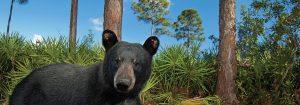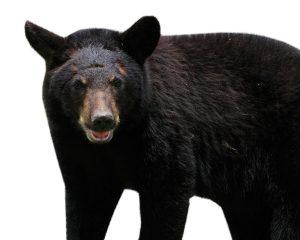 While your yard can be an enjoyable place for you to garden, relax, and spend time with your family and pets, if you’re not careful, it can quickly turn into an all-you-can-eat buffet for bears.
While your yard can be an enjoyable place for you to garden, relax, and spend time with your family and pets, if you’re not careful, it can quickly turn into an all-you-can-eat buffet for bears.
A normal diet for a Florida black bear can be found in the woods or other natural areas, and it includes acorns, berries, insects, and the occasional small wild animal. However, a black bear may decide to visit your yard if it is serving up a menu of good things to eat. Just look around your yard and imagine you are a black bear seeking an easy meal. You scan the yard only to quickly see – and smell – an overflowing garbage can, a big bowl of uneaten dog food, or a generously filled bird feeder. All of these items look and smell tasty to a bear. Remember: a black bear’s nose is so sensitive it can smell things from a mile away.
Luckily, this problem is fairly easy to fix. Learning to be “bear wise” about what attracts bears to your yard is a key component of living without conflicts with bears in Florida. The efforts you take to make your yard less attractive to bears are important for the safety of pets, children and adults. Yet, these same efforts also help conserve the lives of our beloved Florida black bears. Once you prevent bears from getting access to human sources of food, they are likely to stop coming into your neighborhood, which will help reduce human-bear conflicts. An added bonus: those same precautionary steps should also keep foxes, coyotes, raccoons, rats and opossums from wandering into your yard in search of food as well.
 So here are key “bear wise” tips to apply in your yard, whether you live in the city or the country:
So here are key “bear wise” tips to apply in your yard, whether you live in the city or the country:
- Secure garbage in bear-resistant trash cans or in places that are inaccessible, such as a closed garage or sturdy shed. You can also wait until the morning of your garbage pickup to bring trash cans to the curb, as opposed to leaving them out for bears to potentially feast on during the night.
- Feed your pets inside your home, or bring their outside food dishes in at night, even if they are empty. Make sure to store pet or livestock feed in bear-resistant containers.
- At night, remove bird and wildlife feeders and ensure the outdoor areas of your yard are free of all seed, corn, and other wild animal feed (bears love this feed).
- Keep your gardens and orchards tidy by harvesting nuts, fruits and vegetables when they are ripe. Be sure to remove rotten fruit or vegetables.
- Clean your barbeque grills and meat smokers after each use with a degreasing cleaner.
- Use electric fences to protect livestock, beehives, gardens and compost piles.

It is important to keep in mind that a critical conservation issue for Florida black bears is the increase in human-bear conflicts, which has been accelerated by the growing number of both black bears and people in the state. Due to the lack of urgency in securing trash, there has been a surge in human-bear encounters and incidents. In 2015, there were more than 6,000 calls to the Florida Fish and Wildlife Conservation Commission (FWC) about bears, with 30 percent of the calls being trash related incidents.
That being said, the FWC is actively working to partner with homeowners, businesses, local governments and waste management companies to reduce bear attractants and provide technical assistance, as well as incentive funding. If you want to know more about Florida black bears, bear attractants, use of electric fencing and building bear-proof sheds, go to MyFWC.com/Bears. On behalf of the FWC, we are grateful to every homeowner, renter and visitor in Florida who decides to be “bear wise” and share their knowledge with a neighbor. You play a valuable role in helping people and bears coexist safely in this state. ![]()
By Sarah Barrett
Florida Black Bear Management Program
Florida Fish and Wildlife Conservation Commission




